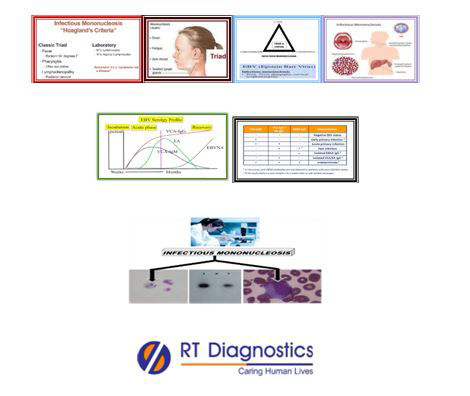Infectious Mononucleosis:
Why Infectious Mononucleosis Test?
CLINICAL INFORMATION
Infectious mononucleosis also called ‘mono’ or “kissing disease” is a contagious disease caused by the Epstein-Barr virus (also known as human herpesvirus 4). Classical signs and symptoms of infectious Mononucleosis are characterized by - TRIAD (Three Striking Features of Triad in mononucleosis infections are) – 1. Fever, 2. Pharyngitis and 3. Adenopathy. Mode of transmission for EBV includes the spread of infection through body fluids – blood (blood transfusion), semen (sexual contact) etc (but more importantly: especially through the saliva), organ transplantation etc. It is usually prevalent among teenagers and young adults. High-risk factors include kissing, sharing drinks and foods, sharing utensils or toothbrushes, contact with toys used by children (drooled on with saliva) etc. After exposure in the oral cavity, EBV infects the B-lymphocytes. After primary infection, EBV remains within the host (within B Cells) for life, and undergoes intermittent asymptomatic shedding from the oropharynx. In the case of Epstein-Barr viral infection, the antibodies are produced against EBV antigen (namely EA- Early Antigen, VCA-Viral Capsid Antigen, EBNA- EBV Nuclear Antigen), hence EBV test targets either EBV antigens or its antibodies. After 6 weeks of exposure to EBV, the other common symptoms may manifest as common cold, fever, sore throat, swollen lymph nodes in the neck (swollen tonsils) and armpits, enlarged spleen and/or liver, body aches, fatigue etc. Untreated chronic infection by infectious mononucleosis may lead to usual complications such as spleen rupture, sharp sudden pain in the abdomen, hepatitis, jaundice, anaemia, thrombocytopenia, heart problems (myocarditis), shortness of breath due to swollen lymph nodes in the neck, neurological manifestations such as meningitis, encephalitis, Guillain-Barre Syndrome etc. Rare complications in severe cases of EBV include the increased risk of certain cancers, immune system disorder (heterophile antibodies – antibodies against poorly defined antigens, are produced against this infection and hence have a high risk of autoantibodies i.e autoimmune diseases), and chronic stages, EBV become active (EBV reactivation) cause interstitial pneumonitis, pancytopenia and uveitis. EBV is also associated with Burkitt lymphoma, Certain B-Cell tumours, certain forms of Hodgkin lymphoma, Nasopharyngeal carcinoma, certain gastric cancers etc. EBV – Antibody Test (IgG): IgM and IgG antibodies appear with the symptoms of the infection, however, IgM appears for a few weeks and disappears, while IgG remains for life. EBV Test is often used to diagnose people suffering from mononucleosis. This test is indicated in cases susceptible to infection (helps to evaluate susceptibility to EBV), Primary infection (new or recent), Past Infection (history of earlier exposure in the past) and most importantly, is one of the TORCH Infections screened during pregnancy. Hence the test for infectious mononucleosis includes antigen and/or antibody tests (ELISA), PCR etc. Additional tests include Monospot Test – Antibody test for Mononucleosis infection. False-positive results can be obtained (in the absence of infection) for EBV; if the patient had previous encounters with any herpes virus subtypes or Toxoplasma gondi. Other tests include CBC, differential count, atypical lymphocytes, neutrocytopenia, ESR, CRP, D-dimer, thrombocytopenia, abnormal liver function assessed by LFT, imaging studies etc.

General Instructions:
Sample Requirement: Specimen - Blood sample collected from the vein. Test Preparation: None.
NOTE - Sample for specimen collections may vary based on the patient’s condition/cases according to the patient’s presenting complaints/signs or symptoms:
SPECIMEN REQUIREMENT (Special or Rare Cases) - As instructed and guided by Physician / Clinician / Pathologist / as per Laboratory’s requirements, according to procedures and protocols.
This Multi-Specialty Clinical Referral Laboratory RT DIAGNOSTICS provides precise and accurate tests with an extensive range of testing services to the medical centres to help in the diagnosis and identification of pathology in the test specimens for infectious diseases and also to evaluate the function of organ systems of the patient. It prevents further complications and helps to stabilize and restore health to near normalcy at the earliest without delay.



